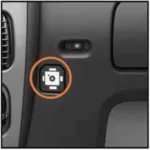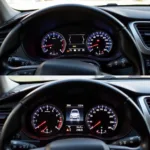Understanding your vehicle’s mileage is crucial, whether for business expenses, tax deductions, or simply keeping track of your driving habits. While traditional methods exist, GPS mileage tracking OBD2 offers a modern and automated solution for accurate and reliable mileage logging.
This comprehensive guide dives deep into the world of GPS mileage tracking using OBD2 technology, exploring its benefits, features, and how it can simplify your life.
How GPS Mileage Tracking OBD2 Works
Combining the power of GPS technology and the wealth of information available through your vehicle’s OBD2 port, GPS mileage tracking offers an elegant solution for logging your miles. Here’s a breakdown of how it works:
-
The OBD2 Connection: Your vehicle’s OBD2 port, typically located under the dashboard, acts as a data hub. A GPS mileage tracker plugs into this port, gaining access to real-time vehicle data, including location, speed, and engine information.
-
GPS Tracking: The tracker utilizes GPS satellites to pinpoint your vehicle’s location with remarkable accuracy. This allows for precise tracking of your routes, distances covered, and even idle times.
-
Data Transmission: The collected data is then transmitted from the tracker to your smartphone or computer via Bluetooth or cellular connection, depending on the device’s capabilities.
-
Mileage Logging and Reporting: User-friendly apps or software associated with the GPS mileage tracker process the data, generating detailed mileage logs. These logs can often be customized, categorized (business vs. personal), and exported in various formats for easy record keeping.
![]() OBD2 Device with GPS Tracking
OBD2 Device with GPS Tracking
Benefits of Using a GPS Mileage Tracking OBD2 System
The advantages of incorporating a GPS mileage tracking OBD2 system into your vehicle are plentiful, offering both convenience and accuracy:
-
Automated Mileage Logs: Say goodbye to tedious manual logging. The system automatically records your trips, eliminating the risk of human error and saving you valuable time.
-
Accurate Mileage Recording: GPS technology provides precise location data, ensuring your mileage logs are accurate and reliable for business expense claims, tax purposes, or personal tracking.
-
Real-Time Tracking: Some advanced trackers offer real-time location tracking, which can be particularly beneficial for businesses managing fleets or individuals concerned about vehicle security.
-
Enhanced Reporting: Generate detailed reports categorized by date, time, and purpose of the trip. This simplifies expense tracking, mileage reimbursements, and tax preparation.
-
Additional Features: Many GPS mileage tracking devices offer additional features beyond simple mileage logging. These can include:
- Vehicle Diagnostics: Receive alerts about potential engine issues or maintenance reminders.
- Driving Behavior Monitoring: Track driving habits like speeding, harsh braking, or rapid acceleration, promoting safer driving practices.
- Vehicle Location History: Access a history of your vehicle’s movements, which can be helpful for route optimization or security purposes.
Choosing the Right GPS Mileage Tracking OBD2 Device
With a variety of GPS mileage tracking options available, selecting the right device for your needs is essential. Consider these factors:
-
Tracking Accuracy: Prioritize devices with high-precision GPS for the most accurate mileage recording.
-
Connectivity: Decide whether Bluetooth or cellular connectivity aligns better with your needs. Bluetooth devices typically sync with your smartphone, while cellular options offer broader coverage and real-time tracking capabilities.
-
App Features: Explore the features offered by the accompanying app or software. Look for features like customizable reports, expense tracking, and potential integrations with other business tools you use.
-
Subscription Costs: Some GPS mileage trackers require monthly or annual subscriptions for data access and app functionalities. Factor these costs into your budget.
-
Device Compatibility: Ensure the chosen GPS tracker is compatible with your vehicle’s make, model, and OBD2 port.
“When choosing a GPS mileage tracker, accuracy and reliability are paramount,” says automotive technology expert, John Smith, lead engineer at AutoTech Solutions. “Look for devices with proven track records and positive user reviews to ensure you’re making a wise investment.”
Conclusion
GPS mileage tracking OBD2 technology provides a seamless and efficient way to monitor your vehicle’s mileage. Whether you’re a business owner looking to simplify expense tracking or an individual seeking to maintain accurate records, GPS mileage tracking offers a range of benefits. By understanding the technology, exploring the available features, and carefully considering your needs, you can choose the perfect device to streamline your mileage logging process.
FAQs
1. Is a GPS mileage tracking OBD2 device difficult to install?
Most GPS mileage tracking devices are designed for easy plug-and-play installation. Simply locate your vehicle’s OBD2 port, typically under the dashboard, and plug in the device.
2. Are GPS mileage tracking logs admissible for tax purposes?
Generally, GPS mileage tracking logs are considered acceptable for tax deductions. However, it’s essential to consult with a tax professional to confirm specific requirements in your region.
3. Can I use a GPS mileage tracking OBD2 device on multiple vehicles?
Some devices are designed for use with a single vehicle, while others offer multi-vehicle tracking capabilities. Consider your needs and choose a device accordingly.
4. What happens if I lose cellular connection while using a GPS mileage tracker?
Most cellular-enabled trackers store data locally if a connection is lost and automatically upload it once the connection is re-established, ensuring no mileage data is lost.
5. Can I track my mileage without a smartphone?
While most GPS mileage trackers rely on smartphone apps for data visualization and report generation, some models may offer alternative methods like web-based dashboards.
For further insights into specific applications of OBD2 technology, explore our related articles:
Need expert guidance? Contact us!
Our team of car diagnostic specialists is available 24/7 to assist you with any questions or concerns. Reach us via WhatsApp at +1(641)206-8880 or email us at [email protected].

